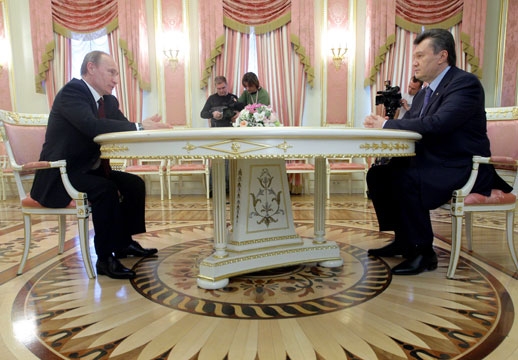Surviving Vladimir Putin’s Blackmail
It’s make-or-break for Ukrainian President Viktor Yanukovych’s push to achieve integration in the European Union.
September 3, 2013 -
Craig Moran
-
Articles and Commentary

Vladimir_Putin_in_Ukraine_April_2011-2.jpg
With just months to go before signing accords at the EU’s Vilnius summit in November, Yanukovych’s EU directive is coming under third-degree threats from Russian President Vladimir Putin. The Ukrainian president’s commitment to the EU, frequently called into question in recent years, is now pushed to prove itself, or his country’s EU dream will be finished.
Many times in recent years, President Yanukovych has been accused of not being fully committed to his country’s EU plans. He has frequently been contrasted to the previous government, which was often openly critical of Ukraine’s colossal neighbour and of Russia’s president Vladimir Putin. By contrast, the incumbent Yanukovych has walked a line somewhere between the powerful forces on both his country’s flanks, the European Union to the West and Mother Russia to the East.
Now though, Ukraine’s future is toppling on the brink of its future, and whether the president is truly committed to the EU or not will be the deciding factor in which way his nations falls. Yanukovych is set to sign an association agreement with European players in November this year at the Eastern Partnership summit in Vilnius, Lithuania. These plans may be severely hampered, however, by Putin’s reaction. The Russian head of state is applying more and more pressure on Kyiv to discourage it from European rapprochement. Can Yanukovych’s EU course survive Russian blackmail until November?
It is true that Yanukovych has in recent years followed a relatively consistent course towards his country’s European Union aspirations: in order to meet the EU’s expectations of candidate states, the president has brought in economic reforms to his country, along with attempts to raise the nation’s democracy through a new criminal procedure code.
Yet the pressure coming from Putin has now become crippling, threatening the destiny of Ukraine’s 64 million-strong population. After days of Ukraine’s internationally renowned confections company Roshen’s exports being denied access to Russian territory, an all-out trade war then became a clear blackmail coming from the Kremlin. All Ukrainian exports entering into the zone of the Russian-led customs union, in which Belarus and Kazakhstan also take part, were then forced to undergo laborious checks, as Moscow had deemed every single item as potentially dangerous.
According to the Federation of Ukrainian Employers, a business lobby group, a trade restriction, predicted heavy losses for Ukrainian businesses. “De facto, there is a complete halt on Ukrainian exports. Actions of the Russian side could incur losses … up to 2.5 billion US dollars in the second half of this year,” said the federation in a statement last week. Over 60 per cent of Ukraine’s exports go to the former Soviet republics, predominantly Russia, Belarus and Kazakhstan.
Yet the words of Sergey Glazyev, a senior economic advisor to President Vladimir Putin, were unforgiving: “We are preparing to tighten customs procedures in case Ukraine suddenly makes this suicidal step of signing the EU association agreement,” the statesman told RIA Novosti.
Under such intense pressure, Ukrainian citizens may well be wondering anxiously whether their president will indeed follow through with his promised commitment to signing the EU association agreement.
His recent comments while giving an Independence Day speech, however, were defiant enough to give his country hope. Ignoring Putin’s blatant threats, Yanukovych declared: “For Ukraine, association with the European Union must become an important stimulus for forming a modern European state.”
He added that “at the same time, we must preserve and continue deepening our relations [and] processes of integration with Russia, countries of the Eurasian community, other world leaders and new centres of economic development”.
Despite the huge number of question marks over Yanukovych’s convictions, regularly coming from opposition leaders, journalists and EU figures, the Ukrainian president may yet prove himself to be the leader who secures his country’s democratic future for good. Signing the association agreement is seen as the action which will finally end the country’s uncertain position between its Western and Eastern flanks, and despite everything, Yanukovych has surprised again and again by his commitment to the cause.
Craig Moran is a geopolitical consultant based in London. His interests include EU enlargement policy and EU-Russia relations.


































